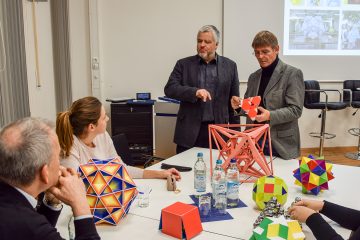Salvation or risk? Geoengineering and the fight against climate change

Munich, 25 July 2023
Efforts to tackle climate change are currently mainly targeted at reducing greenhouse gas emissions. But will this approach work and will it become mainstream policy in the long run? In cooperation with Bayerische Landeszentrale für Politische Bildungsarbeit, acatech am Dienstag brought together experts and visitors in the Amerikahaus on 18 July to discuss questions such as: Should we take other approaches to combat climate change? What possibilities does geoengineering offer? Also, what role do politics and society have in deciding which measures are taken?
Karen Pittel, Leibniz Institute for Economic Research at LMU Munich and acatech Executive Board member, welcomed the 80 guests grouped around tables in the large function room of the Amerikahaus in Karolinenplatz square in Munich. The aim of the evening event was to hold an in-depth debate drawing on input from experts. The audience also included students of the Michaeli-Gymnasium, who had recently taken part in a climate change project day put on by the Bayerische Landeszentrale.
Storing carbon underground, reflecting more sunlight: experts explain geoengineering
First, Gernot Wagner, climate economist and Senior Lecturer, Columbia Business School, New York, USA, explained via live video link that geoengineering encompasses various different technologies and measures. Solar geoengineering means reflecting some of the solar radiation back into space – for example, using stratospheric aerosol injection – before it reaches the surface of Earth and warms it up. This could reduce the global average temperature – regardless of rising carbon and greenhouse gas concentrations. However, while the costs would not be exorbitant, we do not know what the side effects would be. Another form of geoengineering is taking carbon and other greenhouse gases that trap heat in the atmosphere and depositing them, for example, underground. There is enormous potential here but the risks are also huge. Gernot Wagner, however, is confident that it is only a matter of time before such measures, including solar geoengineering, are taken.
Thomas Krismer, Senior Specialist for Climate Risk Management, Munich RE, pointed out that the goals of the Paris Climate Agreement must be attained. Since it would be impossible to prevent all greenhouse gas emissions, natural and technological means and methods must be used to bring about a genuine and lasting reduction in CO2 in the atmosphere – for example, by removing it from the atmosphere, as mentioned. However, this is expensive and would thus have to be funded by higher carbon prices. A method such as carbon capture and storage would also be an eternal problem because, of course, the greenhouse gases would have to be deposited for good. He went on to say that the necessary broad and lasting consensus among scientists and society has not been reached in relation to solar geoengineering – in fact, analysis and debate have only just begun.
Ina Möller, Assistant Professor, Environmental Policy Group | Wageningen Center of Sustainability Governance, Wageningen University and Research, is researching the social dynamics between science, society and politics. Her special field of research is society’s attitude to geoengineering and its effects on climate policy. She made it clear that many geoengineering technologies would be controversial because their effects and side effects are uncertain – and because they do not take into account the causes of climate change. She also said that to date there are very few official guidelines concerning geoengineering – one likely reason being that the science on this is incomplete and uncertain.
Heated debate around the tables
The input from the experts provided ample material for the debates that were subsequently held amongst those seated at the tables. The participants asked questions they had about the technology and gave their own opinions and positions in relation to geoengineering. Global climate change was also looked at in this context: How should we address it? Can technology play a part? Is an international moratorium on geoengineering perhaps required, which prohibits measures, and possibly even research on it? What are the alternatives? Experts and attendees agreed that the possibilities that geoengineering offers must not make us lose sight of the causes of climate change.
Further information
Reflecting Sunlight. Recommendations for Solar Geoengineering Research and Research Governance (2021)
Should we dim the sun? The gamble that is trying to stop the climate crisis using geoengineering (7 February 2023) (in German)





